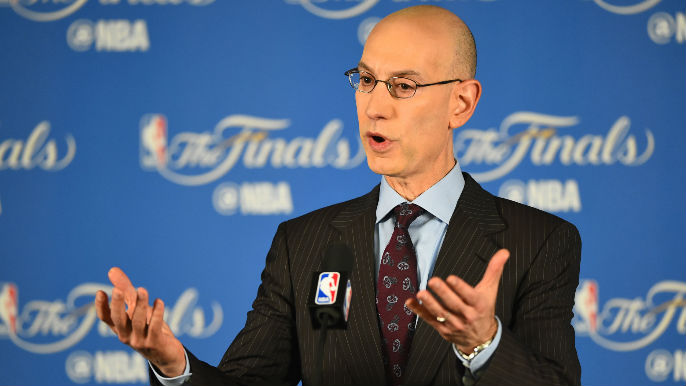Kevin Durant signing with the Warriors was a seismic shift in demonstrating how much power NBA players now possess.
If the future is up to Adam Silver, and he certainly will have a hand in it, the jump Durant just made to Golden State will become much harder for other superstars in upcoming years.
The Commissioner body slammed super teams and their residual impact for the rest of the NBA at a news conference Tuesday night in Las Vegas.
“This notion of two super teams that it’s a huge television attraction — I don’t think it’s good for the league. Just to be really clear,” Silver told reporters covering the Summer League. “There’s no question, when you aggregate a group of great players, they have a better chance of winning than many other teams.”
Perhaps more troubling than his condemnation of super teams was the commissioner insinuating that he and the owners believe corrections in the league’s CBA could help prevent teams like the Warriors from acquiring the most talented players. There is an opt-out clause in the CBA available for the owners to use in the summer of 2017, and it’s not hard to predict the 29 other owners will do everything in their power to try and break up the Warriors with a harsh set of new contract rules.
“I think we can make the system better,” Silver said. “I think that it is critically important that teams in every market have that belief, that if their team is well managed, that they can compete. Certainly it’s important to me that markets in this league, those that are perceived as small, and those that are larger all feel that they have an equal chance.”
Silver’s comments are a reminder that it’s the owners and their billions who still trump the players and their millions. LeBron James’ infamous decision to form a super team in Miami was the stepping stone for Durant to leave for the Bay Area. But Silver wants the league to reflect communism more than capitalism. The best players should be spread throughout the league, not bundled together, argues the commissioner.
It’s the salary cap spike from $70.1 million to $94 million that made it possible for Durant to sign with nearly any team he wanted to. Projections for the 2017 cap have been as high as $104 million, meaning if nothing is done, A-List free agents such as Chris Paul, Russell Westbrook and Blake Griffin could all conspire together. Durant’s move alongside increasing salaries for marginal players clearly has ignited a backlash from the owners.
“By the way, I don’t mean to be so cryptic, in the case of Kevin Durant, I absolutely respect his decision once he becomes a free agent to make a choice that’s available to him. In this case, he operated 100 percent within the system and same with Golden State.
“Having said that, I do think to maintain those principals that I discussed, in terms of creating a league in which every team has the opportunity to compete, I think we do need to reexamine some of the elements of our system so that I’m not here next year or the year after and talking about anomalies. There are certain things, corrections, we believe we can make in the system.
“My belief is that we can make it better.”
The last time the owners locked out the players was in 2011 — maybe not so ironically a year after LeBron left Cleveland — and it lasted from July 1 until December 8. David Stern represented the owners while NBPA president Billy Hunter and player president Derek Fisher represented the players. It got ugly.
Don’t expect the players to budge if it does come down to a lockout next summer. It is the general belief that the owners were the clearcut winners of the 2011 negotiations, as the players took home a reduced share of revenue and there were reductions to contract lengths. And with the league currently prospering thanks to a new generation of superstars like Durant and Steph Curry, it would be difficult to fault the players for playing hardball.
By the way, Curry is scheduled to become a free agent next summer. So any plans Bob Myers was mapping out within the current rules could have to be entirely scrapped. The argument for the Warriors is that other teams should draft better players and allocate their funds for superstar talent. Golden State didn’t get lucky, they just outsmarted every other franchise. This thing was built from the depths of despair. Owner Joe Lacob saved a floundering organization.
And to be fair, the NBA has always had super teams. The Celtics and Lakers of the 80s, the Bulls of the 90s, the Lakers of the early 2000s, the Celtics of the late 2000s, the Heat of the early 2010s and now the Warriors. Collecting superstar talent generally equals championships — granted Golden State has a previously unheard of four of the top 15 players in the league. And the owners freaking out.
It wasn’t as historic as Durant’s move to the Warriors, but Silver dropped quite a public bombshell on Tuesday about the future of the NBA. It would be a shame for basketball to hit the pause button just as it was starting to encroach on the NFL’s grip of the country’s favorite sport.


